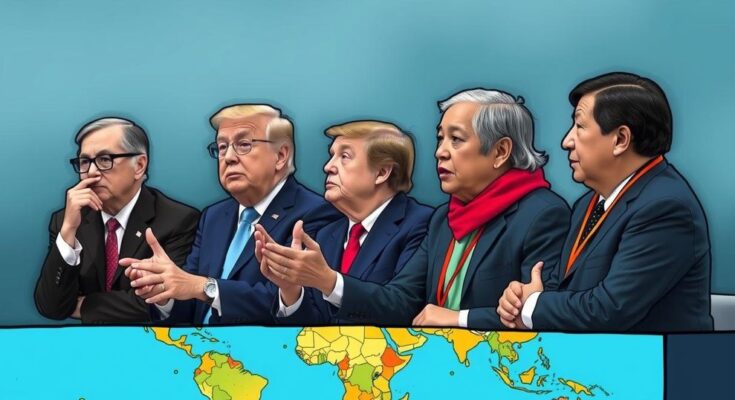Amid a growing climate crisis, several leaders, including from Papua New Guinea and Argentina, are skipping this year’s COP climate conference. Papua New Guinea’s Prime Minister voiced concerns over inadequate support from industrialized nations. Argentina’s delegation left under President Javier Milei’s climate skepticism, raising alarm about the country’s commitment to climate agreements. Absences from G20 leaders reflect ongoing discontent and the urgency of cooperative climate action.
As the global community confronts an escalating climate crisis, a notable number of leaders are absent from this year’s Conference of the Parties (COP) climate conference. This annual gathering typically draws world leaders, climate scientists, and advocates to address the urgent challenges posed by climate change, yet some countries have opted not to participate. Among the most surprising absentees is Papua New Guinea, which officially boycotted the event, signaling discontentment with larger nations that have historically failed to adequately support vulnerable countries affected by climate change. Prime Minister James Marape articulated that this decision aims to protest the lack of assistance from industrialized nations and bring attention to the plight of those severely impacted by environmental degradation.
In addition to Papua New Guinea, Argentina’s delegation withdrew unexpectedly after President Javier Milei, known for his climate skepticism, called back the entire cohort. This action raised concerns about Argentina’s commitment to international climate agreements, particularly the Paris Agreement. Various leaders from significant G20 nations like the United States, India, and Germany also abstained from direct participation, although they did send delegates to represent their interests. France’s ecological transition minister, Agnes Pannier-Runacher, further complicated matters by boycotting the conference following harsh criticisms from Azerbaijani Prime Minister Ilham Aliyev, who accused France of colonialism and environmental negligence.
The decision of these countries to skip COP29 highlights a growing rift between industrialized and developing nations in the climate dialogue and underscores the increasing urgency of coordinated global action. Advocacy for sustainable practices and climate justice is paramount, especially as the repercussions of climate inaction continue to intensify, threatening livelihoods across the globe. The stakes have never been higher, as the actions—or lack thereof—taken at such conferences can have far-reaching implications for the future of our planet.
The Conference of the Parties (COP) is an essential annual event organized by the United Nations where leaders from various countries convene to discuss and negotiate actions pertaining to climate change. Given the increasing severity of climate-related disasters in recent years, the COP conferences have become crucial for formulating collective responses to the unfolding crisis. However, the participation of global leaders can vary significantly from year to year based on several factors, including political climates and the perceived urgency of the issues at hand. Historically, attendees comprise a mix of countries with varying degrees of commitment to international climate agreements, and the absence of key players can undermine the effectiveness and accountability expected from such assemblies.
In summary, the absence of several key leaders from this year’s COP climate conference raises critical questions about international commitment to combating climate change. Papua New Guinea’s thorough boycott and Argentina’s abrupt withdrawal highlight profound dissatisfaction with the existing framework for climate action, particularly from vulnerable nations advocating for more significant support. The ongoing absence of leadership from significant G20 countries further complicates the landscape of global climate negotiations, emphasizing the necessity for constructive dialogue and urgent action as the climate crisis progresses. As the repercussions of climate change become increasingly dire, the need for global unity and responsibility remains paramount, making the outcomes of such conferences pivotal for the future of environmental stewardship and justice worldwide.
Original Source: abcnews.go.com




